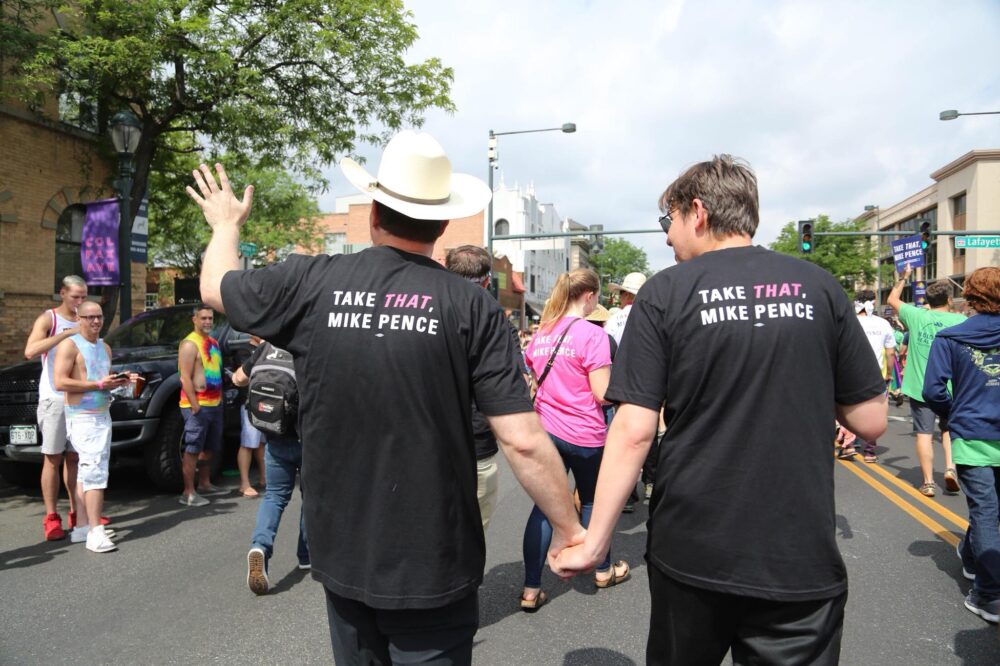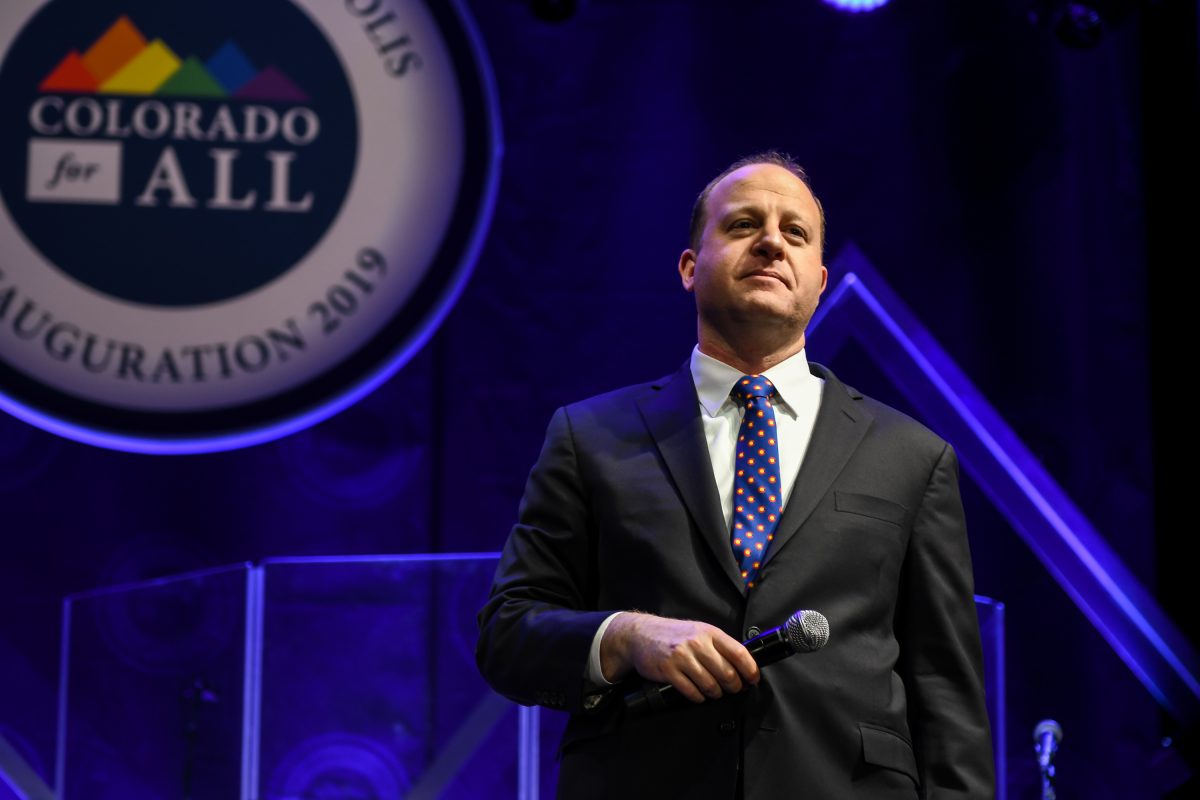Jared Polis Makes History As Nation’s First Openly Gay Governor

Jared Polis is officially the Governor of Colorado and the first openly gay man to be elected governor in U.S. history.
Polis won against Republican candidate Walker Stapleton after a tumultuous campaign season. It all paid off, as Polis, his husband, and their two children pack their bags and move into the governor’s mansion.
“Colorado has always been a forward thinking state,” Polis told OUT FRONT.
Although former Gov. Jim McGreevey of New Jersey, a Democrat, made history by coming out as gay while in office in 2004, Polis would be the first openly gay man elected governor. Oregon Gov. Kate Brown is also the nation’s first openly bisexual governor, as well as the first openly LGBTQ governor when taking office.

Breaking Barriers
Polis’ career in public service has been defined by a series of shattering the glass ceiling.
By age 33, Polis had already launched several successful businesses, founded schools for young immigrants and other vulnerable kids, chaired the Colorado Board of Education, and led a ballot measure that banned gifts from lobbyists to Colorado lawmakers. He had been elected to Congress.
After his election in 2008, Polis worked with President Obama and democratic leaders to repeal Don’t Ask, Don’t Tell; the gavel used for the bill’s passage is still prominently displayed in his office. And with his help, the Congressional LGBT Equality Caucus transformed from a quiet organization unknown outside progressive circles into a political powerhouse.
In 2011, Polis busted through another barrier: he and his partner, Marlon Reis, welcomed their first child, making Polis the first openly gay parent in Congressional history.
“Every Coloradan, every American, deserves to look at their elected leaders in government and see themselves represented,” Polis said. “When LGBTQ Americans are in positions of leadership, it shows the country we aren’t just an abstraction they read about in the news. It shows we are real people—parents, sons and daughters, teachers, neighbors, co-workers, business owners, faith leaders.”
For Polis, the importance of representation goes beyond sending a message. It translates directly into policy.
Polis has used his position to aggressively advocate for the rights of LGBTQ Americans. In addition to his efforts to overturn Don’t Ask, Don’t Tell, Polis helped to pass a landmark hate crimes law that expanded federal protections based on sexual orientation, gender identity, or disability. He also led legislative proposals to stop anti-LGBTQ discrimination at school and in the workplace.
“One of my major goals here in Colorado is building an economy that works for everyone,” Polis said. “But as a nation, our economy can’t work for everyone if some people have to worry about losing their job simply because of who they are or who they love.”
Polis was a driving force behind President Obama’s official guidance in 2016 that existing civil rights law protects transgender and gender nonconforming students from discrimination at school. President Trump reversed President Obama’s guidance almost immediately upon taking office.
“Now more than ever, we need a governor who will stand up for the rights of all Coloradans, whether that’s LGBTQ folks, women, racial and religious minorities, or our immigrant communities,” Polis said.
Fighting For Representation
The number of LGBTQ people nominated to run for Congress during this election was four times higher than it was in 2010—activated by greater social acceptance of queer folks and a surge of liberal energy to oppose Trump and radical republicans.
According to the Victory Fund, a nonpartisan group that supports and tracks queer political candidates, there were 21 openly LGBTQ people nominated for Congress and four for governor. All of them are democrats. Overall, there were more than 430 openly queer people running for office at all levels of government at the start of this year’s primary season. At least 244 of them advanced to a ballot in November, including some independents and candidates for nonpartisan positions.
The four queer people up for governor all represent a different letter in the acronym LGBT. Polis stands alongside Oregon’s Kate Brown a bisexual woman who is running for reelection; Lupe Valdez, a lesbian in Texas; and Christine Hallquist, a transgender woman in Vermont.
In Colorado, there were six LGBTQ candidates running for the State House, including the state’s first transgender candidate for the House of Representatives.
What We Can Expect
Polis was openly and unapologetically liberal during his campaign and vows to keep the promises he made at that time.
“Our campaign is about a bold vision for where we go as a state, because we have an historic opportunity before us,” Polis told OUT FRONT in January.
“I want Colorado to lead the way into the future with universal pre-K for every child, a thriving renewable-energy sector, and an economy that works for all Coloradans.”
Polis, who jumped into politics with a successful run for the state board of education and as the founder of several charter schools, made education one of the keystones of his campaign.
He hopes to end his first legislative session as governor with full-day kindergarten throughout the state and more slots for preschools. He also took aim at four-day school weeks and district-to-district funding disparities.
Polis’ pledge to push us towards a “thriving renewable energy sector” includes setting the state on the path to 100 percent renewable energy by 2040. Polis opposed Proposition 112, which would mandate a 2,500-foot setback for any new oil and gas development from buildings designed for human occupancy. Instead, he calls for more local control on setting restrictions pertaining to oil and gas development.
On Polis’ campaign website, he makes his opinion on healthcare very clear, stating, “Healthcare is a human right… I believe passionately in universal healthcare, and I always will.”
While universal healthcare is one of Polis’ stated goals, Polis does support a Medicare-for-all bill, because that’s a federal program and not something necessarily translatable to the state level. Instead, he’s pushed the focus on his “100-Day Roadmap” of healthcare policy and a broader goal of forming a bargaining compact with nearby states.
He wants to make Colorado a single region for health insurance ratings purposes with goals of lowering costs for rural and mountain-based Coloradans, improving price transparency, making it easier for doctors and health care professionals to set up shop in Colorado, pushing community health clinics, and more.
He’s also a strong believer in full equality and is willing to stand up against issues the current U.S. Supreme Court may go after, including abortion and LGBTQ rights. Some fear the court will dismantle federal protections, and it will then be up to individual states. If that happens, the position of governor becomes more important than ever.
“I will lead legislation to preserve reproductive choice in the Colorado Statute so that Coloradans’ basic rights don’t come and go based on the ideological makeup of the Supreme Court,” Polis told OUT FRONT in October. “Every, single Coloradan, no matter who they are or who they love, should be able to attend school, get a good-paying job, and live affordably in the community they call home without being subjected to discrimination or harassment.”
“These issues aren’t about liberal versus conservative,” Polis said. “They’re about forward versus backward.”
Photos provided by Jared Polis and Facebook.













